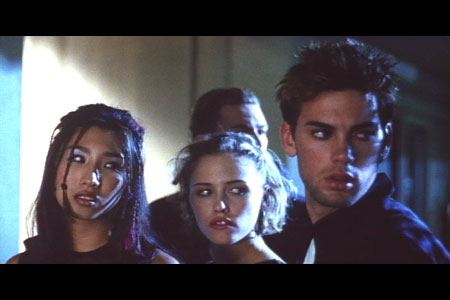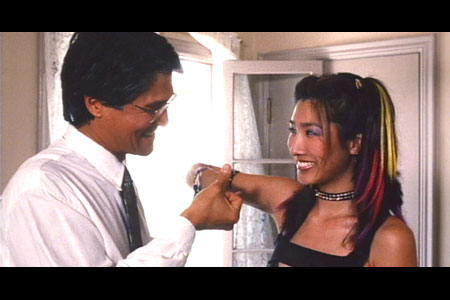

Word games are fun. For instance, take the word "WORD." If one changes one letter at a time, with each change creating another valid word, how many times does it take to get to the word "NAVY?" In a way, the film Close Call is similar. Take the film Thirteen. Advance the age of the primary characters a few years. Change the nationality to Korean. And, most importantly, remove the actors who have big names and can act, and replace them with little known actors who cannot. And then take away any semblance of a script. Viola! Close Call. The first bad sign that something may be amiss with this film is that two of the actors are also some of the films producers. It's really a shame, since one gets the feeling that there is a decent, albeit familiar story to tell here, just wrapped in a big cocoon of junk. The main issue is that the film is so melodramatic. It blows away any sense of reality by going as far as possible in every scenario.
So calling high schooler Jenny Kim (Annie Lee) "trouble" is an understatement. Jenny has problems up the wazoo. Her parents divorced acrimoniously when she was young. Her father David (Philip Moon, Love Kills, No Salida) truly loves Jenny, but an angry outburst in court cost him visitation rights, so he went back to Korea. Jenny's mother Joanne (Christine Ma, Kiss the Girls, Long Life, Happiness, & Prosperity) is at work far too much to be there as a parent. As a result, Jenny fell into the wrong crowd. Her best friend Becky (Faleena Hopkins, Some Kinda Joke, Some Body) is a couple years older. She was kicked out of school, and now sells drugs. Jenny cares little for school, opting for a life of non-stop drugs, drinking, sex, and partying. Some especially bad experiences land Jenny in jail, where she comes to the attention of Elliot Krasner (Jeff Fahey, Unspeakable, Fallen Angels). Krasner was David's friend and lawyer during the divorce. After seeing Jenny's plight, he contacts David, who decides to come back to America to save his daughter.
It sounds very noble, but the way that writer/director Jimmy Lee (Hanging Heart) goes about everything destroys any meaningful emotion. Jenny and David approach each other from histrionic extremes, which makes things comical. Jenny wants to do whatever she wants, which is believable; she is a teenager after all. David's solution seems to be to turn her into a stereotypical Korean student wonder by making her study, learn Korean, relearn her culture, and other random things. The only person with a brain is Krasner, who tells David to support Jenny, even though he may disagree. He just needs to give her some freedom. He also has a heart condition, so if he gets too excited, he may get another heart attack. Gee, what will probably happen later in the film? Adding to the soap operatics is the fact that Joanne told Jenny when she was a child that David abandoned her, causing a lot of resent to well up over the years. Plus, there are some truly sappy flashbacks for David and a young Jenny, flying a kite or playing in the backyard.
Close Call begins in the bathroom of a club, with Jenny hanging herself, then flashes back to go over the bulk of what led to this. Given the name of the title, it's not a big surprise what happens. Presumably, part of what Lee is trying to push across is that children need a strong parental influence. Jenny has a huge empty space in her life that she fills with all sorts of junk. David is trying to get back into her life, and as he does, she dresses more demurely, her studies increase, and she rediscovers her heritage. It's pretty simple-minded to portray things as so black-and-white, with no middle ground. Worse, when he throws armed robbery and murder into the film, it approaches the level of comedy. Lee (Jimmy) just heaps too many troubles upon Jenny. Lee (Annie) is not much of an actor, and when the script calls for her to show extreme emotion (especially when she needs to cry), it's not pleasant to sit through. As for Moon, man does he have a smooth voice. It sounds like the boom was sitting inside his shirt for most of the Close Call. He has the type of voice one would expect to hear in dandruff commercials or on a late night adult contemporary or soft jazz station. Although his character goes through many emotions, his vocal modulation never changes. He sounds laid back (with his mind on his money and his money on his mind...and his daughter). The film is too sappy and overwrought to take seriously. For a better choice along barely similar lines, watch Better Luck Tomorrow.